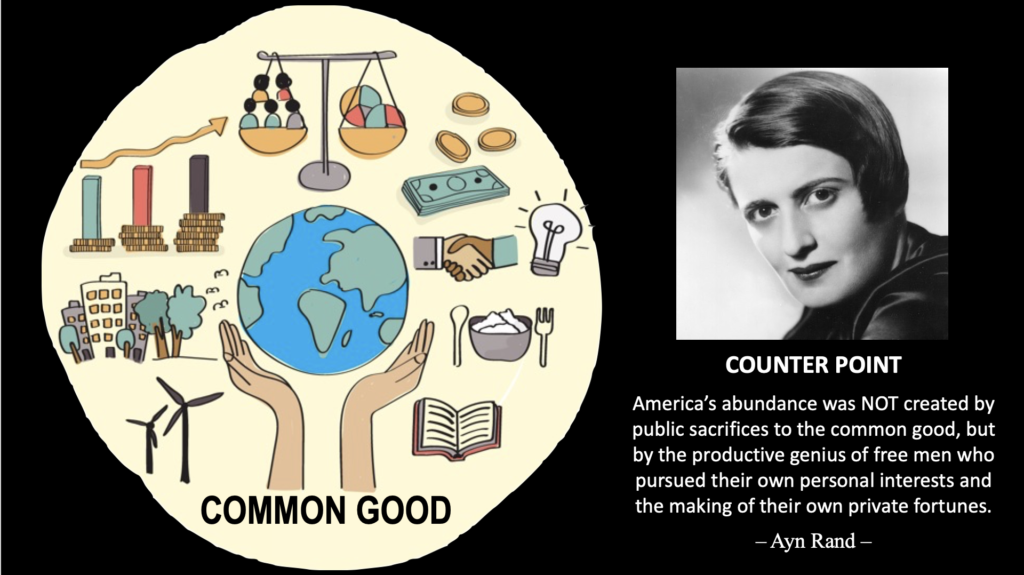Healthcare and The Common Good

What exactly is the Common Good, and how does health care, education, and other programs fit in? Robert Reich and I have one view, but Ayn Rand and Libertarians have another. Here are highlights from Reich’s essay on The Common Good, followed by my response.
The idea of The Common Good’ was once widely understood and accepted in America. After all, the U.S. Constitution was designed for “We the people” seeking to ‘promote the general welfare’ — not for ‘me the selfish jerk seeking as much wealth and power as possible.’
What happened? One clue is found in the writings of writer-philosopher Ayn Rand, who argued that the common good was bunk. …
Starting in the late 1970s, Rand became the intellectual godmother of modern-day American conservatism, especially its libertarian strand. … [But] Rand, Nozick, and their more modern incarnations are dangerously wrong. Not only does the common good exist, but it is essential for a society to function. …
[Without the common good,] We would be living in a jungle where only the strongest, cleverest, and most wary could hope to survive. [Those with power would be encouraged to lie, cheat, and bribe their way to more wealth, and more power, at the expense of others. That’s the Trump world. Consider his invention of ‘alternative facts.’] …
The followers of Ayn Rand who glorify the ‘free market’ and denigrate ‘government’ are fooling themselves if they think the ‘free market’ gets them off this Trump hook. …
Truth itself is a common good. Through history, one of the first things tyrants do is attack independent truth-tellers — philosophers (Plato), scientists (Galileo), and the free and independent press — thereby confusing the public and substituting their own ‘facts.’”
My Response to Robert Reich’s Essay
As I wrote in AMERICA BROKEN: critiquing Capitalism, Healthcare & Politics, there is no such thing as Free-Market Capitalism without rules governing Property, Monopoly, Contracts, and Bankruptcy. But who makes the rules, and who enforces them? Capitalism today has been distorted by wide disparities of wealth, influence, and opportunity. Our laws and political systems have become rigged against all but the wealthiest among us who can buy influence.
Sadly, “Free-market capitalism” is no longer played on a level playing field, because large corporations can invest in lawyers and paid lobbyists, gain political influence, effectively “buy” elections by directing unlimited funds to political action committees, and even do that entirely in secret. With that, they can craft laws in their favor, rather than for what’s in the common good.
In a related article, Corporate Behavior and Rising Health Care Costs, I wrote about the legal requirement and operational principles of a corporation to serve shareholder investment interests. That gives modern corporations a highly anti-social “personality.” You see, corporations are inherently self-interested (profit-driven), so they often are amoral, callous, and deceitful, and even breaching social and legal standards to get their way. While they can mimic the human qualities of empathy, caring and altruism, corporations don’t suffer from guilt, and they can’t be jailed. So, in short, modern corporations behave like sociopaths, using their wealth and political clout to avoid taxation, regulation, and reform.
Health, Health Care, Medical Care, and the Common Good
According to the now-defunct President’s Council on Bioethics, health and medical care have long been objects of moral concern and controversy in the United States. They concluded medical care is a critical element of the common good. That’s because ensuring that medical care is provided to those who need it helps them sustain their health, wellbeing, productivity, and contribution to society overall. Besides that, access to Medical Care is seen as a moral obligation of any good society. That view is consistent with my own writings:
Our nation long ago ensured its most vulnerable citizens got necessary medical care in several ways. Federal programs like Medicare, Medicaid, and S-CHIP provided care access to the elderly, the disabled, some of the poor, and some children. The Veterans Administration provided care benefits to those who served in the armed forces. The federal law EMTALA requires emergency rooms to treat anyone seeking treatment without regard to insurance status or ability to pay. Federal and state governments help hospitals and physicians defray some of the costs of indigent patient care. We also signaled the unique importance of health and medical care by exempting the cost of employer-based health insurance from taxes.
Despite these efforts, and even with pandemic enhancements to the Affordable Care Act, over 27 million Americans still lack any form of public or private coverage for medical care. While EMTALA does require emergency rooms to stabilize patients before discharging them, this does ensure they can sustain their condition upon discharge.
The Council’s policy debates focused attention on medical care rather than health or health care, and they argued that medical care shares qualities of public goods but is best seen as a “critical element of the common good.” That gives medical care a special moral standing that contributes to workforce productivity and the individual pursuit of happiness.
Public Education and the Common Good
The U.S. accepts that a certain level of public education will help sustain and enhance the common good even as it directly benefits those individuals who are educated. Moreover, it equips us individually not only with a sense of community and of our shared heritage, but also with skills and information that allow us to be better participants in a civil society.
Public education is seen as so important that we not only provide access to all citizens but require them to receive a minimal level of education. Cultivating the intelligence of its citizenry, and contributing to its workforce productivity, is also seen as an element of the common good, and as such is an object of moral concern for the state.
Other Elements of The Common Good
Society (as represented by governmental institutions) ordinarily provides, protects, and or regulates both pure public goods and any number of mixed goods to sustain the common good.
Examples not yet mentioned include:
- Maintaining domestic and national security,
- Maintaining a legal system for resolution of disagreements and enforcement of laws, Maintaining a safe public water supply,
- Regulating industries to ensure breathable air and a relatively clean environment,
- Maintaining systems of public sanitation and public health, and
- Supporting and regulating transportation systems (highways, airports, seaports)
The list goes on, and while some describe these as socialist programs, they all help sustain a social union that allows individuals and society to flourish – i.e. The Common Good.
ABOUT THE AUTHOR
Wayne Caswell is a retired IBM technologist, futurist, market strategist, consumer advocate, sleep economist, and founding editor of Modern Health Talk. With international leadership experience developing wireless networks, sensors, and smart home technologies, he’s been an advocate for Big Broadband and fiber-to-the-home while also enjoying success lobbying for consumers. Wayne leans left to support progressive policies but considers himself politically independent. (contact & BIO)

